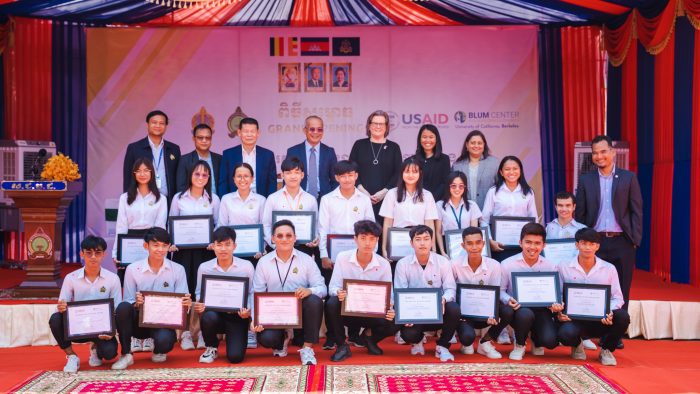The USAID Digital Workforce Development program, led by the Blum Center for Developing Economies and its partners, including ELIX Organization and the Asia Foundation, has won USAID’s Digital Development Award for upskilling Cambodia youth to meet the needs of the digital era.
USAID confers “Digi Awards” to USAID projects and activities that “embrace the Agency’s strategic goals of improving development and humanitarian assistance outcomes through the responsible use of digital technology and strengthening open, secure, and inclusive digital ecosystems.” DWD, which launched in 2022, has strengthened the information and technology (ICT) skills of Cambodian faculty, developed career centers at their universities, overseen skills training for students, and provided scholarships in the digital and ICT fields, particularly for rural, female students.
“Thank you for enabling Cambodia’s youth to succeed in a global digital economy,” said Kerry Pelzman, mission director for USAID/Cambodia, in the agency’s announcement of the awards.
“It is great to be able to highlight the work and the progress we’ve made to a global audience, including the crucial collaboration amongst the local universities and private sector partners taking place, and their commitment to our mission,” said Chanda Pen, DWD’s Chief of Party. “Tackling the gargantuan task of preparing the country’s workforce for the digital age is only possible with their integral support.”
“It was a collective effort,” he added, “showcasing the power of a high-performing team, motivated under a shared vision.”
The numbers speak for themselves: Across 12 higher-education institutions in Cambodia, DWD trained 124 professionals and over 3,300 15–29–year-olds in digital skills and topics ranging from financial technology to Python to machine learning to virtual business management. Five career centers aided another 22,000 students in finding resources and job opportunities in the ICT industry — a sector crucial to the sustained development of one of the world’s fastest growing economies. Seventy-four students — nearly two-thirds of whom are women — received scholarships to study digital-related degrees.

From 2022 to 2023, an additional 11,000 rural students from 32 schools received basic computer coding lessons from 128 university student volunteers via DWD’s KHoding Hero program, in partnership with Cambodia Academy of Digital Technology (CADT). By the end of their lessons, the number of students interested in ICT careers had jumped to 26 percent. USAID noted the project’s 26 local and international private sector partners contributed more than $300,000 USD in support, in addition to playing an integral role in “identifying workforce skill gaps, hosting workshops and speaker sessions, participating in career fairs, conducting walk-in interviews at partnering higher education institutions, and shaping the activity’s approach to internships.”
USAID also recognized DWD for its focus on end users’ contexts and needs, as well as its ability to evolve with the findings and results of its various stakeholders.
Announcing the award, USAID noted that “DWD leveraged a collaborative and user-centric approach, which gives students a comprehensive understanding of potential ICT career paths.”
“The activity’s built-in feedback mechanisms allowed it to adjust activities proactively based on the real-time needs of students, employers, and faculty,” the agency added. “The activity also developed a comprehensive handbook for digital education that will be publicly available and free of charge, and it designed a cost-sharing business model for university career centers to attract sponsorships from private sector partners.”
In two years, DWD has become a model for others’ efforts, including preparing the country for “Industry 4.0” — the incorporation of “smart,” connected, digital technologies into manufacturing.
“USAID/Cambodia continues to share DWD’s approaches, including its private sector engagement strategy, as a resource for other programs within the country,” the agency noted.
Pen called out DWD’s higher education institution (HEI) and private-sector partners, including the National University of Management, the National University of Battambang, Svay Rieng University, ACLEDA University of Business, University of South-East Asia, Cambodia Academy of Digital Technology, the Royal University of Phnom Penh, the Institute of Technology of Cambodia, the Association of Banks in Cambodia, Amazon Web Services, EZECOM, Cellcard, Phillip Bank, Canadia Bank, and Khmer Enterprise.
“We are extremely appreciative to our private sector partners, HEI partners, USAID Cambodia, and the team at UC Berkeley, including George Scharffenberger and Whitney Hischier,” Pen said. “Their steadfast support and their willingness and commitment to collaborate with us in an agile approach have been invaluable to our mission.”

